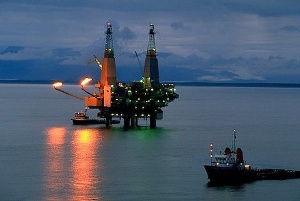- Home - News
- TWI News | TV
- Polls
- Year In Review
- News Archive
- Crime & Punishment
- Politics
- Regional
- Editorial
- Health
- Ghanaians Abroad
- Tabloid
- Africa
- Religion
- Election 2020
- Coronavirus
- News Videos | TV
- Photo Archives
- News Headlines
- Press Release
Business News of Thursday, 6 March 2014
Source: GNA
High bank rates, challenge for Oil and Gas industry
The prospect of the Ghana’s oil and gas sector will rocket, if banks could reduce their interest rates for indigenous companies in the sector to maximise their potential from the local content law.
Dr Juliette Twumasi-Anokye, Coordinator of Local Content at the Petroleum Commission (PC) said this when she took members of the Ghana Oil and Gas Service Providers Association (GOGSPA) through provisions of the local content law.
The workshop was organised by the Ghana Oil and Gas Service Providers Association (GOGSPA) to educate its members on the Petroleum (Local Content and Local Participation) Regulation, 2013 (LI 2204).
She said Nigeria had a smooth implementation of the law because of the low interest rates charged by banks in that country. She said, with interest rates of banks pegged above 18 per cent as compared to six per cent in other countries, local companies in the oil and gas industry would find it difficult to do business.
The essence of the law was to enable the country to have a firm grip of the oil and gas industry and, subsequently, take over its management.
She said local content was about value addition, human capital development, financial investment and technological know-how. Dr Twumasi-Anokye said the local content law provided for at least five per cent equity participation of indigenous companies in the oil and gas industry.
According to her, the law requires Ghanaians to own at least 51 per cent shares, 80 per cent of senior management positions and 100 per cent management staff in local companies.
The law also states that any Ghanaian who is found fronting for foreign companies would be liable to specified a punishment under the law, including a term of imprisonment.
She cited lack of capacity as one of the major challenges that local companies faced in the industry and noted that PC could put in place the requisite legal and regulatory framework, but if local companies did step up their game to meet the necessary requirements in the industry there was nothing the PC could do.
The commission was undertaking a value chain audit to look at all goods and services provided in the industry in order to know the kind of services that could be provided locally, she said.
The PC, she said would never compromise on the provision of the law that reserved services such as catering in the oil and gas industry to Ghanaian companies.
The President of GOGSPA, Mr Kamil Mohammed, urged members of GOGSPA to avail themselves to enable the association facilitate the registration with PC. The local content law came into full effect on February 19, 2014, three months after it had been passed by Parliament.
The three-month transitional period was to give the PC and the industry players time to prepare for the implementation of the law.
Entertainment










